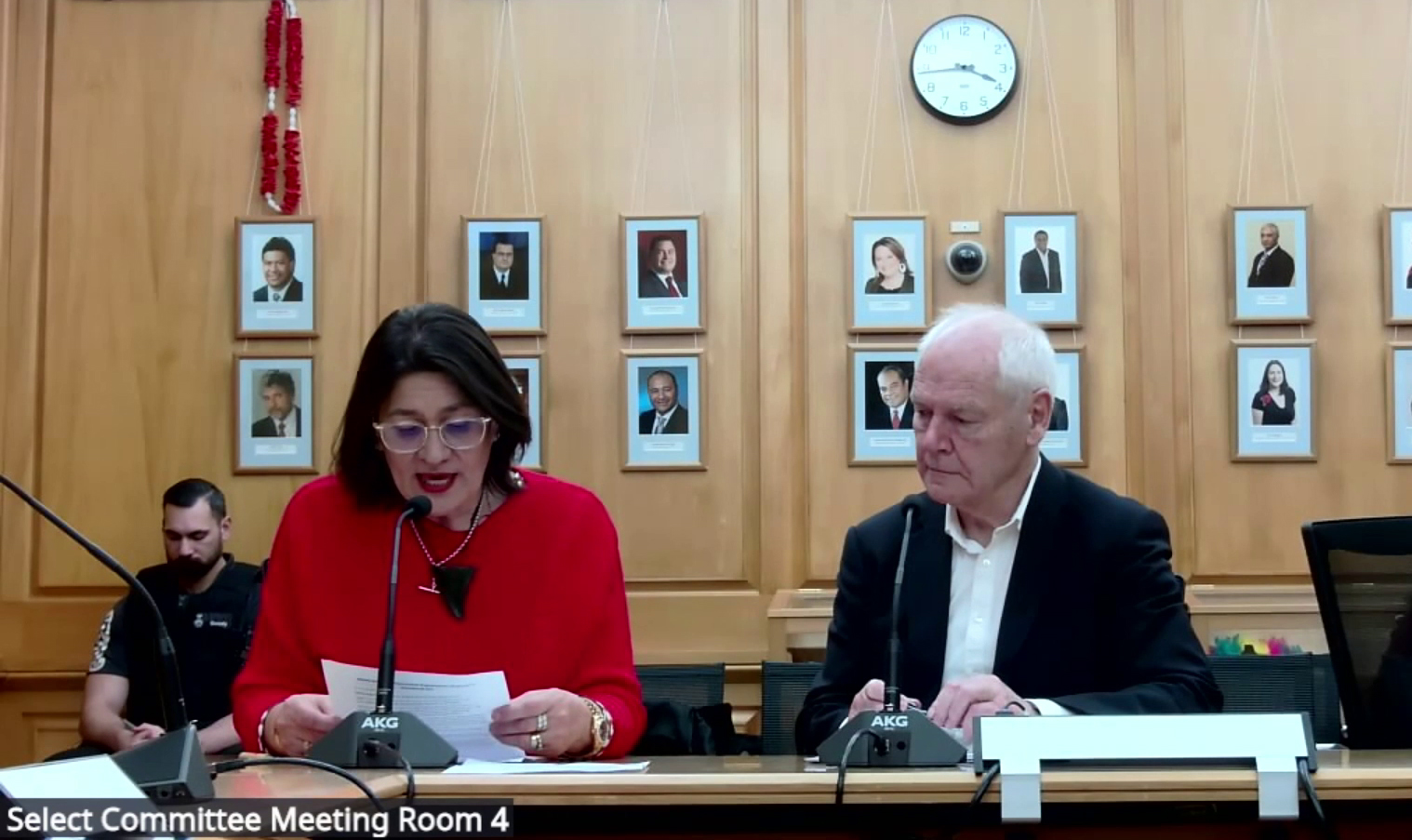NZNO kaiwhakahaere Kerri Nuku and chief executive Paul Goulter make their submission to the parliamentary select committee considering the Regulatory Standards Bill.
Kaiwhakahaere Kerri Nuku has slammed David Seymour for leaving a legacy of early deaths for Māori as part of the NZNO select committee submission on his Regulatory Standards Bill.
It came as NZNO chief executive Paul Goulter said the Bill ignored the place of Te Tiriti in Aotearoa and jeopardised public health.
“We see it as promoting a supremacy of individual-based property rights, over important collective rights,” he said.
‘The Regulatory Standards Bill will remove the Crown’s obligation to Te Tiriti of Waitangi and silence the voice of Māori in decision-making in health.’
The Bill threatened the long-established public health system — which despite currently being under strain, was a collective right of all New Zealanders, he said.
“The direction of the Bill threatens the collective right by holding it secondary to the individual right.”

He said public health initiatives such as fluoridation protecting communities would be held subject to the rights of individuals to remain unprotected.
Nuku said Māori nurses and health-care assistants were in a unique position to witness everyday inequities in the health sector – leaving Māori more likely to suffer preventable illness, and comorbidities.
“Our people are dying, already, at a faster rate.”
Te Rūnanga was concerned the Bill would continue these health inequities, through ACT’s effort to “expunge history and the intergenerational trauma of Māori”, she said.
This trauma left many fearing and mistrusting doctors and hospitals, leaving them with higher rates of the likes of diabetes, asthma, heart disease and lung cancer.

“The Regulatory Standards Bill will remove the Crown’s obligation to Te Tiriti of Waitangi and silence the voice of Māori in decision-making in health.”
Nuku said the Bill would leave a legacy for ACT leader David Seymour — that Māori remain sicker than others and continue to die at a faster rate than non-Māori.
“This is devastating We urge the . . . select committee to recommend Parliament vote this Bill down at its next reading.”
ACT’s regulatory power grab
National promised to support the Bill as part of its coalition agreement with ACT.
If passed, it would force laws to be checked against a set of ACT’s principles espousing the likes of individual liberty and freedoms. There would be no principles covering Te Tiriti.
‘This is devastating — we urge the . . . select committee to recommend Parliament vote this Bill down at its next reading.’
Lawmakers and regulators would have to assess regulation against the principles, and if they don’t match, ministers would have to explain why. It would come into effect from January 1, next year.
ACT leader David Seymour claimed it would would raise the political cost of bad regulation, potentially cut red tape and cast “sunlight” on politicians’ activities.

“It will finally ensure regulatory decisions are based on principles of good law-making and economic efficiency.”
The anti-Treaty pincer movement
In May an urgent Waitangi Tribunal hearing found that if passed without meaningful Māori consultation the Bill would breach the principles of the Treaty.
Experts at the hearing slammed the bill as part of a legislative pincer movement by ACT — alongside its now-dumped Treaty Principles Bill.
Its proposed regulatory standards board would act as an anti-Waitangi Tribunal, Te Tiriti expert Carwyn Jones said. It could be called through public complaints to hold inquiries and make non-binding recommendations — much like the tribunal.
However, in the board’s case it could then systematically recommend removing Treaty principles from legislation.




